Module 2 A Job Worth Doing 学案(外研版必修5)
文档属性
| 名称 | Module 2 A Job Worth Doing 学案(外研版必修5) | 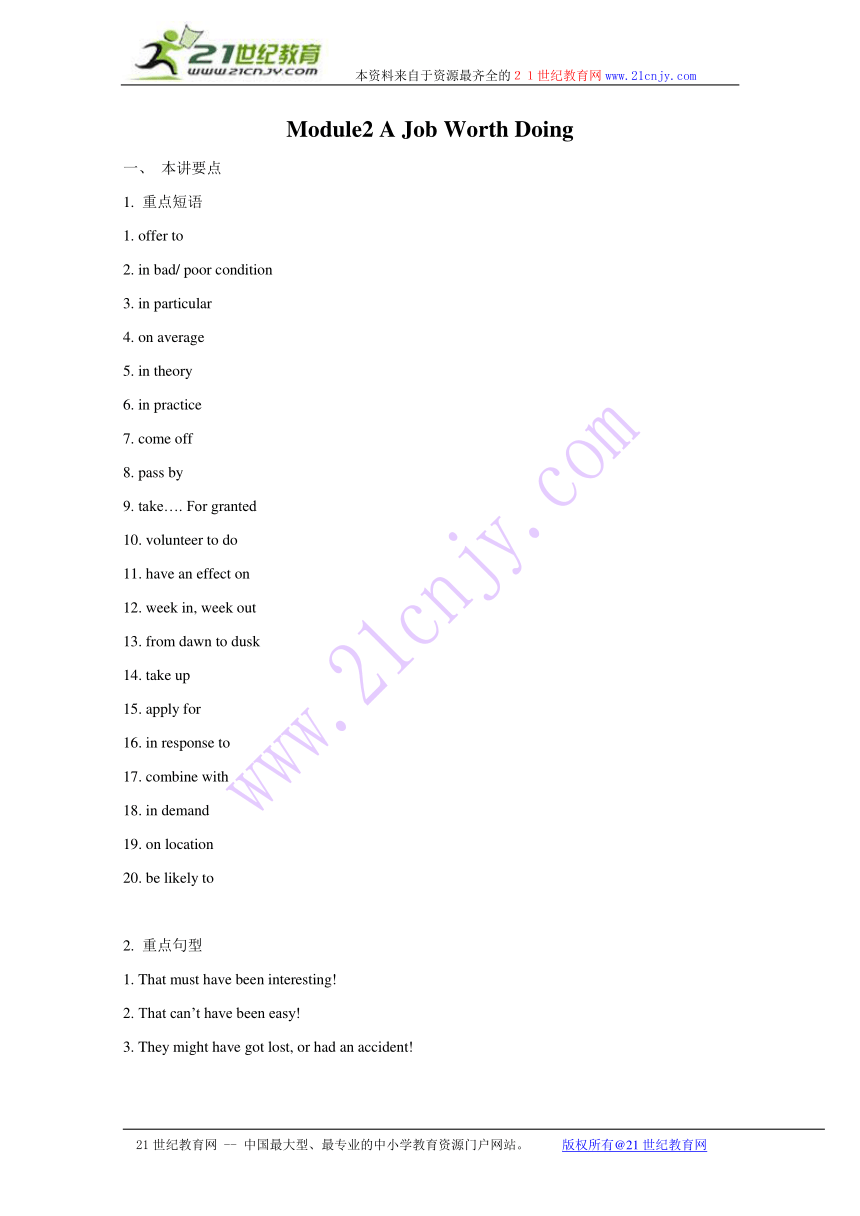 | |
| 格式 | rar | ||
| 文件大小 | 20.9KB | ||
| 资源类型 | 教案 | ||
| 版本资源 | 外研版 | ||
| 科目 | 英语 | ||
| 更新时间 | 2009-07-07 18:42:00 | ||
图片预览

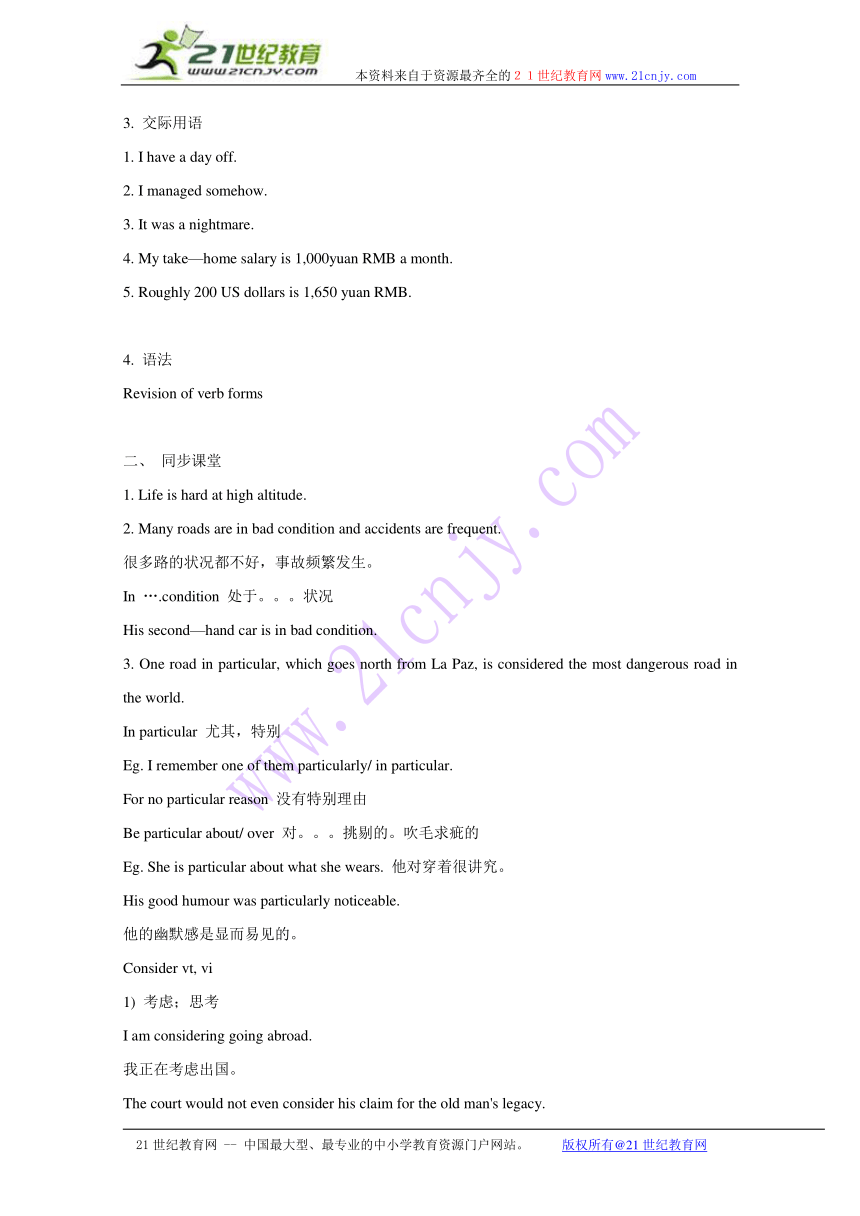
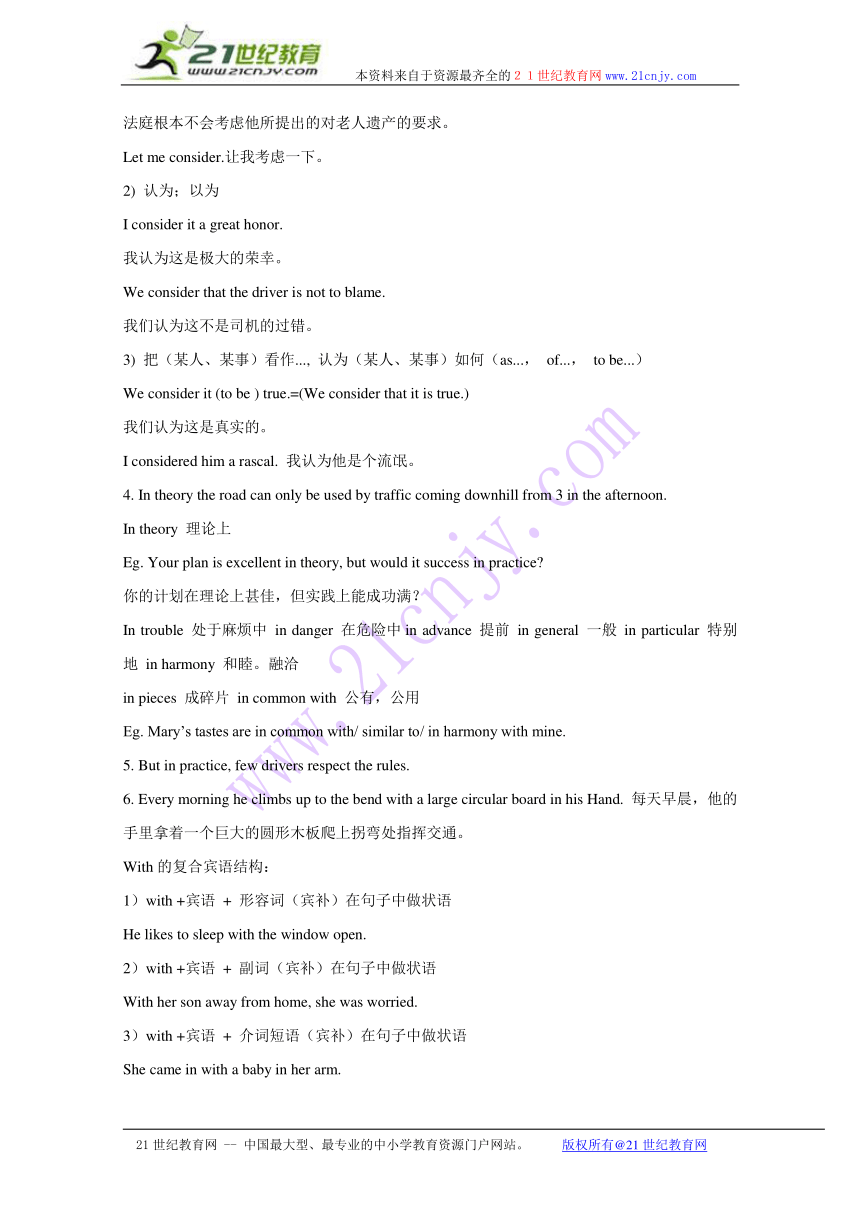
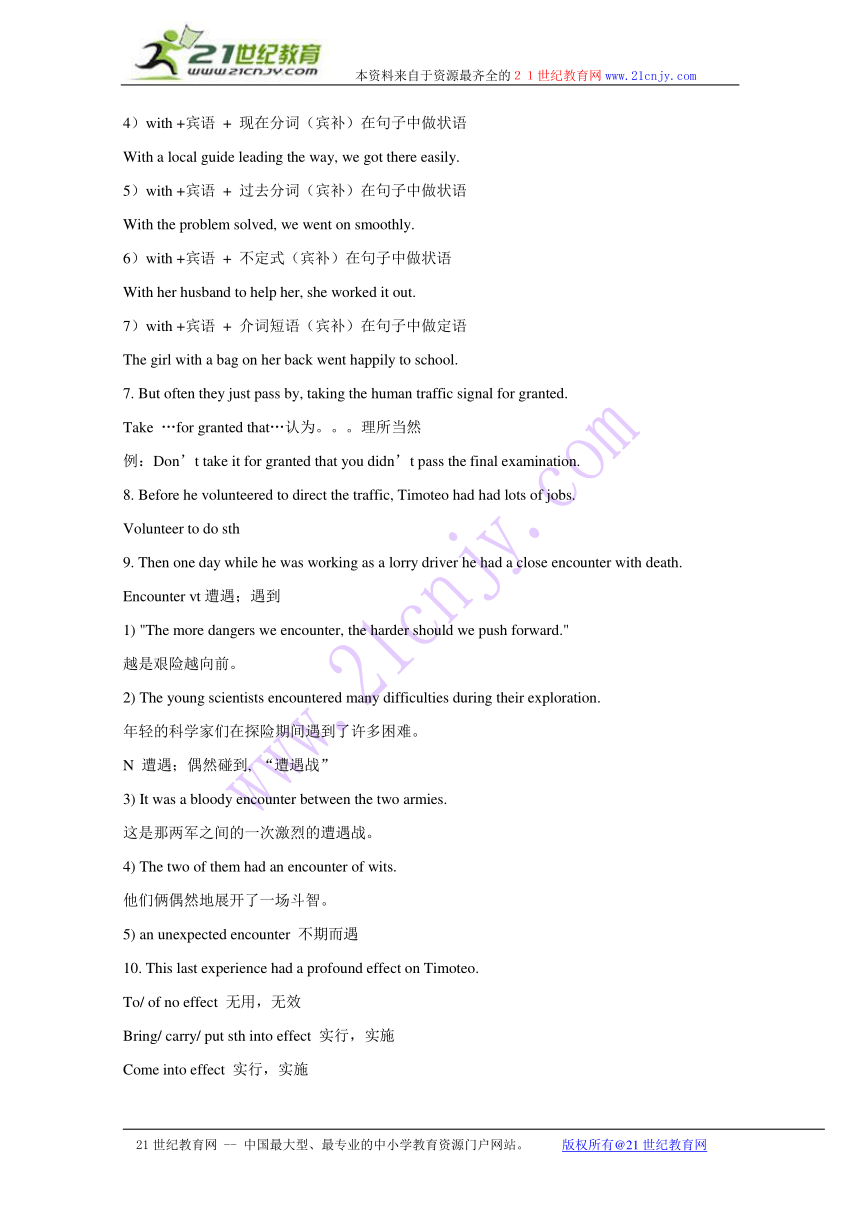
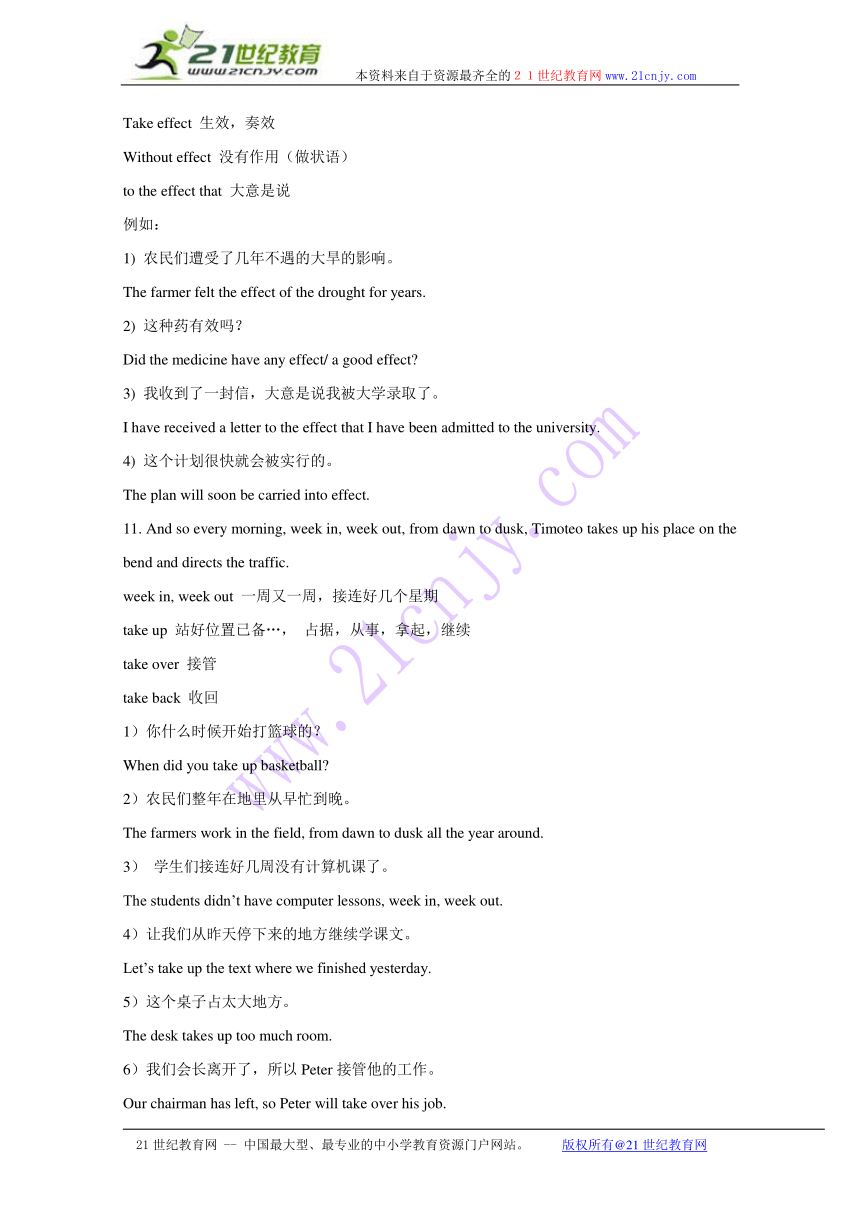
文档简介
本资料来自于资源最齐全的21世纪教育网www.21cnjy.com
Module2 A Job Worth Doing
一、 本讲要点
1. 重点短语
1. offer to
2. in bad/ poor condition
3. in particular
4. on average
5. in theory
6. in practice
7. come off
8. pass by
9. take…. For granted
10. volunteer to do
11. have an effect on
12. week in, week out
13. from dawn to dusk
14. take up
15. apply for
16. in response to
bine with
18. in demand
19. on location
20. be likely to
2. 重点句型
1. That must have been interesting!
2. That can’t have been easy!
3. They might have got lost, or had an accident!
3. 交际用语
1. I have a day off.
2. I managed somehow.
3. It was a nightmare.
4. My take—home salary is 1,000yuan RMB a month.
5. Roughly 200 US dollars is 1,650 yuan RMB.
4. 语法
Revision of verb forms
二、 同步课堂
1. Life is hard at high altitude.
2. Many roads are in bad condition and accidents are frequent.
很多路的状况都不好,事故频繁发生。
In ….condition 处于。。。状况
His second—hand car is in bad condition.
3. One road in particular, which goes north from La Paz, is considered the most dangerous road in the world.
In particular 尤其,特别
Eg. I remember one of them particularly/ in particular.
For no particular reason 没有特别理由
Be particular about/ over 对。。。挑剔的。吹毛求疵的
Eg. She is particular about what she wears. 他对穿着很讲究。
His good humour was particularly noticeable.
他的幽默感是显而易见的。
Consider vt, vi
1) 考虑;思考
I am considering going abroad.
我正在考虑出国。
The court would not even consider his claim for the old man's legacy.
法庭根本不会考虑他所提出的对老人遗产的要求。
Let me consider.让我考虑一下。
2) 认为;以为
I consider it a great honor.
我认为这是极大的荣幸。
We consider that the driver is not to blame.
我们认为这不是司机的过错。
3) 把(某人、某事)看作..., 认为(某人、某事)如何(as..., of..., to be...)
We consider it (to be ) true.=(We consider that it is true.)
我们认为这是真实的。
I considered him a rascal. 我认为他是个流氓。
4. In theory the road can only be used by traffic coming downhill from 3 in the afternoon.
In theory 理论上
Eg. Your plan is excellent in theory, but would it success in practice
你的计划在理论上甚佳,但实践上能成功满?
In trouble 处于麻烦中 in danger 在危险中in advance 提前 in general 一般 in particular 特别地 in harmony 和睦。融洽
in pieces 成碎片 in common with 公有,公用
Eg. Mary’s tastes are in common with/ similar to/ in harmony with mine.
5. But in practice, few drivers respect the rules.
6. Every morning he climbs up to the bend with a large circular board in his Hand. 每天早晨,他的手里拿着一个巨大的圆形木板爬上拐弯处指挥交通。
With的复合宾语结构:
1)with +宾语 + 形容词(宾补)在句子中做状语
He likes to sleep with the window open.
2)with +宾语 + 副词(宾补)在句子中做状语
With her son away from home, she was worried.
3)with +宾语 + 介词短语(宾补)在句子中做状语
She came in with a baby in her arm.
4)with +宾语 + 现在分词(宾补)在句子中做状语
With a local guide leading the way, we got there easily.
5)with +宾语 + 过去分词(宾补)在句子中做状语
With the problem solved, we went on smoothly.
6)with +宾语 + 不定式(宾补)在句子中做状语
With her husband to help her, she worked it out.
7)with +宾语 + 介词短语(宾补)在句子中做定语
The girl with a bag on her back went happily to school.
7. But often they just pass by, taking the human traffic signal for granted.
Take …for granted that…认为。。。理所当然
例:Don’t take it for granted that you didn’t pass the final examination.
8. Before he volunteered to direct the traffic, Timoteo had had lots of jobs.
Volunteer to do sth
9. Then one day while he was working as a lorry driver he had a close encounter with death.
Encounter vt遭遇;遇到
1) "The more dangers we encounter, the harder should we push forward."
越是艰险越向前。
2) The young scientists encountered many difficulties during their exploration.
年轻的科学家们在探险期间遇到了许多困难。
N 遭遇;偶然碰到, “遭遇战”
3) It was a bloody encounter between the two armies.
这是那两军之间的一次激烈的遭遇战。
4) The two of them had an encounter of wits.
他们俩偶然地展开了一场斗智。
5) an unexpected encounter 不期而遇
10. This last experience had a profound effect on Timoteo.
To/ of no effect 无用,无效
Bring/ carry/ put sth into effect 实行,实施
Come into effect 实行,实施
Take effect 生效,奏效
Without effect 没有作用(做状语)
to the effect that 大意是说
例如:
1) 农民们遭受了几年不遇的大旱的影响。
The farmer felt the effect of the drought for years.
2) 这种药有效吗?
Did the medicine have any effect/ a good effect
3) 我收到了一封信,大意是说我被大学录取了。
I have received a letter to the effect that I have been admitted to the university.
4) 这个计划很快就会被实行的。
The plan will soon be carried into effect.
11. And so every morning, week in, week out, from dawn to dusk, Timoteo takes up his place on the bend and directs the traffic.
week in, week out 一周又一周,接连好几个星期
take up 站好位置已备…, 占据,从事,拿起,继续
take over 接管
take back 收回
1)你什么时候开始打篮球的?
When did you take up basketball
2)农民们整年在地里从早忙到晚。
The farmers work in the field, from dawn to dusk all the year around.
3) 学生们接连好几周没有计算机课了。
The students didn’t have computer lessons, week in, week out.
4)让我们从昨天停下来的地方继续学课文。
Let’s take up the text where we finished yesterday.
5)这个桌子占太大地方。
The desk takes up too much room.
6)我们会长离开了,所以Peter接管他的工作。
Our chairman has left, so Peter will take over his job.
7)很抱歉伤害了你,我收回刚刚说过的话。
I’m sorry to have hurt you; I take back what I said just now.
12. demand: 要求,需要
N.1) 要求;请求
Ives listened to the workers' demand for more money.
艾夫斯听着工人们要争取更多钱的要求。
2) 需求;需要
It is impossible to satisfy all demands. 有求必应是不可能的。
Teachers are in demand in this area. 在这个地区很需要教师。
vt
3) 要求
demand an apology from sb. 要求某人道歉
demand a clear answer 要求(作出)明确的答复
I demand that John (should) go there at once.
我要约翰马上去那儿。
4) 急需;迫切需要
This work demands your attention
这工作急需你去做。
in (great) demand 需要量很大; 许多人都需要
on demand 在要求时, 一经请求; 在要求支付时
13. intellectual: adj 脑力的,思维的,需用才智的; N知识分子
the intellectual faculties 智能 intellectual people 有才智的人 intellectually 有才智地 intelligence [U] 智力,才智
intelligent adj. 聪明的,有才智的
Designing houses is an intelligent job, but George can easily make it intellectual.
14. satisfying: adj 令人满意的 satisfied: adj 感到满意的
satisfaction N. 满意/满足;令人满足的事
satisfy: vt 使…满意
例如:
Your success will be a great satisfaction to your parents.
The result of the experiment was satisfactory.
Have you satisfied yourself of the truth of the report
Bored—boring excited—exciting embarrassed—embarrassing disappointed—disappointing moved--moving
15. stressful: adj 有压力的, stressless 没有重音的,没有压力的
stress: n 压力,重音
in times of stress 在艰难时期
lay/ place/ put stress on/ upon 把重点放在
例如:
The stress is on the second syllable.
He stressed the point that we should be punctual.
He laid special stress on the analyzing the particularity of the conditions.
The work that miners do is dangerous and stressful.
16. volunteer
n 志愿者
We want some volunteers to help paint the house.
我们想要几个自愿帮助漆房屋的人。
vt, vi (常与to连用)自愿去做,主动请求去做
We all volunteered to paint the house.
我们都自愿漆这房子。
Meanwhile, a number of university students have volunteered to drive buses while the strike lasts.
与此同时,许多大学生自愿在罢工持续期间去驾驶公共汽车。
The doctor who had volunteered to settled down in the poor village became the chief fable of the villagers.
这个志愿到这个穷村庄落户的医生成了村民们的中心话题。
adj. 志愿者的,由志愿者组成的,或志愿者做的:
volunteer firefighters; volunteer tutoring.
志愿消防员;志愿导游
voluntary 自愿的,自动的
17. offer
vt, vi 提供;提出
offer a few ideas提出几点意见
I must offer them an apology for not going to attend their get-gathering.
我没有去出席他们的聚会,必须向他们示歉意。
He offered me 300 dollars for that television.
他出300美元向我买那部电视机。
(与to连用)表示愿意;试图
offer to go 自愿前往
offer to help sb. 表示愿意帮助某人
n 提议; 出价;报盘
an offer of £100 出价100 英镑
提供
I have been offered a large sum of money to go away, but I am determined to stay here.
有人曾向我提供大笔款项让我搬迁,但我决心留在这里。
Thank you for your offer of help.
感谢你提供的帮助。
18. earn: vt 挣(钱)
earn one’s living 谋生
earnings N 赚得的钱
1) 他取得的成就使他受到尊敬和钦佩。
His achievements earn him respect and admiration.
2)这钱有七厘利息。
The money earns 7%interest.
19. permanent: adj 长久的,永久的,永恒的
Eg.
1) Is your new job permanent or temporary
2) A permanent force 常备军
3) A permanent committee 常设委员会
20. salary: n 工资,薪水----salary, wage, fee
salary 指按月发的薪水,领取薪水者通常是经过培训而具有特殊技能或专门知识的人
1) He told me that the firm could not afford to pay such large salaries
他告诉我说,公司付不起那么多薪水了。
2) What's your salary 你领取多少薪水?
3) Teachers, government officials and clerks receive salaries.
教师,政府官员和职员接受薪水。
wage一般指按星期甚至按天发的工资,领取工资者通常是做体力劳动的人
4) The young wage -earner often earns good money…
挣工资的年轻人往往挣很多钱……
5) His wages are high, prices are high, too.
工资高,物价也高。
fee一词在英语中指付给医生、音乐师、美术工作者或律师的报酬。
6) The doctor's fee is $ 25 a visit.
7) School fees are high in that country.
21. staff: n 全体职员,员工
the staff of a school 学校的全体工作人员
a staff member (=a member of the staff) 职员之一
the teaching staff 全体教员
the domestic staff 佣人
a military [naval] staff college 陆[海]军参谋学院
22. sign: vt 签字,签署
sign a letter在信件上签字
I want all of you to sign.我要你们全都签字。
The firm signed on fifty more workers last week.
上星期该公司签约增雇了五十名工人。
sign sb. to enter对某人打手势让他进来
sign a street 给街道立标志
The policeman signed (for) them to stop.
警察做手势叫他们停住。
He signed to me to be quiet.
他做手势要我安静。
N 记号,符号, 身势,姿势;信号
He made a sign for me to follow him.
他向我示意跟着他(走)。
告示;标语; 牌示,牌子
The sign by the road said‘No Parking'.
路边的牌子上写着“禁止停车”。
迹象;征兆;征候
There are no signs of life about the house.
这房子没有有人住的迹象。
23. Grammar: Review of verb forms(2)
一般过去时
1)在确定的过去时间里所发生的动作或存在的状态。
时间状语有:yesterday, last week, an hour ago, the other day, in 1982等。
Where did you go just now
2)表示在过去一段时间内,经常性或习惯性的动作。
When I was a child, I often played football in the street.
Whenever the Browns went during their visit, they were given a warm welcome.
3)句型:
It is time for sb. to do sth "到……时间了" "该……了"
It is time sb. did sth. "时间已迟了" "早该……了"
It is time for you to go to bed. 你该睡觉了。
It is time you went to bed. 你早该睡觉了。
would (had) rather sb. did sth. 表示'宁愿某人做某事'
I'd rather you came tomorrow.
4) wish, wonder, think, hope 等用过去时,作试探性的询问、请求、建议等。
I thought you might have some. 我以为你想要一些。
过去进行时
1) 概念:表示过去某时正在进行的状态或动作。
2) 过去进行时的主要用法是描述一件事发生的背景;一个长动作发生的时候,另一个短动作发生。
4) 常用的时间状语: this morning, the whole morning, all day yesterday, from nine to ten last evening, when, while
My brother fell while he was riding his bicycle and hurt himself.
It was raining when they left the station.
When I got to the top of the mountain, the sun was shining.
过去完成时
过去完成时表示过去某个时间以前已经完成的动作,强调“过去的过去”。常以before, by+过去时间,或when, before等引导的过去时态的从句来表示,也可以通过上下文来表示。
I had written the criticism article when they came.
他们来时,我已写完了那篇评论。
They left earlier than we had expected.
他们离开的时间比我们预料的要早。
典型题例
1. Peter ___come with us tonight, but he isn't very sure yet.
A. must B. may C. can D. will
解析:表可能性只能用may. 此句意可从后半句推出。 答案B.
2. ---Could I borrow your dictionary
---Yes, of course, you____.
A. might B. will C. can D. should
解析:could表示委婉的语气,并不为时态。答语中of course,表示肯定的语气,允许某人做某事时,用can和 may来表达,不能用could或might。复习: will 与you连用,用来提出要求或下命令。should与you 连用,用来提出劝告。答案C.
3. Tom ought not to ___ me your secret, but he meant no harm.
A. have told B. tell C. be telling D. having told
解析: 由于后句为过去时,告诉秘密的动作又发生在其前因,此地应用过去完成时,但它在情态动词 ought to 后,所以用have。答案A。
4. It’s nearly seven o’clock. Jack _____ be here at any moment.
A. must B. need C. should D. can
精析: should 为情态动词, “应该”。选C.
5. Mary ___ a dress when she cut her finger.
A. made B. is making C. was making D. makes
解析:答案C. 割伤手指是已发生的事情,应用过去时。同 时,when表时间的同时性,"玛丽在做衣服时"提供事情发生的背景,因此用过去进行时。
6. As she ___ the newspaper, Granny ___ asleep.
A. read; was falling B. was reading; fell C. was reading; was falling D. read;fell
解析:答案B.句中的as = when, while,意为"当……之时"。描述一件事发生的背景时,用过去进行;一个长动作发生的时候,另一个短动作发生。句意为 "在她看报纸时,奶奶睡着了。"句中的 fell (fall的过去时),是系动词,后跟形容词,如:fall sick。
7. When I arrived at the station, he had already left. We had learned about 4000 English words by the end of last term. I waited until he had finished his homework. We were surprised at what she had done. We ____our breakfast when an old man came to the door.
A just have had B have just had C just had D had just had
解析:本题吃饭的动作在来的动作之前,考察过去完成时的用法,正确答案为D.
8. Before the first nonstop flight made in1949, it____ necessary for all planes to land for refueling.
A would be B has been C had been D would have been
解析:本题时间状语从句为一般过去时,主句的情况是在从句之前,是“过去的过去”,因此用过去完成时,答案为C.
9.Until then, his family ____ from him for six month.?
A didn't hear B hasn't been hearing C hasn't heard D hadn't heard
解析:过去完成时可以表示过去某一时间以前已经发生并继续发生的事情,本句考察的正是过去完成时的这一用法,故答案为D.
21世纪教育网 -- 中国最大型、最专业的中小学教育资源门户网站。 版权所有@21世纪教育网
Module2 A Job Worth Doing
一、 本讲要点
1. 重点短语
1. offer to
2. in bad/ poor condition
3. in particular
4. on average
5. in theory
6. in practice
7. come off
8. pass by
9. take…. For granted
10. volunteer to do
11. have an effect on
12. week in, week out
13. from dawn to dusk
14. take up
15. apply for
16. in response to
bine with
18. in demand
19. on location
20. be likely to
2. 重点句型
1. That must have been interesting!
2. That can’t have been easy!
3. They might have got lost, or had an accident!
3. 交际用语
1. I have a day off.
2. I managed somehow.
3. It was a nightmare.
4. My take—home salary is 1,000yuan RMB a month.
5. Roughly 200 US dollars is 1,650 yuan RMB.
4. 语法
Revision of verb forms
二、 同步课堂
1. Life is hard at high altitude.
2. Many roads are in bad condition and accidents are frequent.
很多路的状况都不好,事故频繁发生。
In ….condition 处于。。。状况
His second—hand car is in bad condition.
3. One road in particular, which goes north from La Paz, is considered the most dangerous road in the world.
In particular 尤其,特别
Eg. I remember one of them particularly/ in particular.
For no particular reason 没有特别理由
Be particular about/ over 对。。。挑剔的。吹毛求疵的
Eg. She is particular about what she wears. 他对穿着很讲究。
His good humour was particularly noticeable.
他的幽默感是显而易见的。
Consider vt, vi
1) 考虑;思考
I am considering going abroad.
我正在考虑出国。
The court would not even consider his claim for the old man's legacy.
法庭根本不会考虑他所提出的对老人遗产的要求。
Let me consider.让我考虑一下。
2) 认为;以为
I consider it a great honor.
我认为这是极大的荣幸。
We consider that the driver is not to blame.
我们认为这不是司机的过错。
3) 把(某人、某事)看作..., 认为(某人、某事)如何(as..., of..., to be...)
We consider it (to be ) true.=(We consider that it is true.)
我们认为这是真实的。
I considered him a rascal. 我认为他是个流氓。
4. In theory the road can only be used by traffic coming downhill from 3 in the afternoon.
In theory 理论上
Eg. Your plan is excellent in theory, but would it success in practice
你的计划在理论上甚佳,但实践上能成功满?
In trouble 处于麻烦中 in danger 在危险中in advance 提前 in general 一般 in particular 特别地 in harmony 和睦。融洽
in pieces 成碎片 in common with 公有,公用
Eg. Mary’s tastes are in common with/ similar to/ in harmony with mine.
5. But in practice, few drivers respect the rules.
6. Every morning he climbs up to the bend with a large circular board in his Hand. 每天早晨,他的手里拿着一个巨大的圆形木板爬上拐弯处指挥交通。
With的复合宾语结构:
1)with +宾语 + 形容词(宾补)在句子中做状语
He likes to sleep with the window open.
2)with +宾语 + 副词(宾补)在句子中做状语
With her son away from home, she was worried.
3)with +宾语 + 介词短语(宾补)在句子中做状语
She came in with a baby in her arm.
4)with +宾语 + 现在分词(宾补)在句子中做状语
With a local guide leading the way, we got there easily.
5)with +宾语 + 过去分词(宾补)在句子中做状语
With the problem solved, we went on smoothly.
6)with +宾语 + 不定式(宾补)在句子中做状语
With her husband to help her, she worked it out.
7)with +宾语 + 介词短语(宾补)在句子中做定语
The girl with a bag on her back went happily to school.
7. But often they just pass by, taking the human traffic signal for granted.
Take …for granted that…认为。。。理所当然
例:Don’t take it for granted that you didn’t pass the final examination.
8. Before he volunteered to direct the traffic, Timoteo had had lots of jobs.
Volunteer to do sth
9. Then one day while he was working as a lorry driver he had a close encounter with death.
Encounter vt遭遇;遇到
1) "The more dangers we encounter, the harder should we push forward."
越是艰险越向前。
2) The young scientists encountered many difficulties during their exploration.
年轻的科学家们在探险期间遇到了许多困难。
N 遭遇;偶然碰到, “遭遇战”
3) It was a bloody encounter between the two armies.
这是那两军之间的一次激烈的遭遇战。
4) The two of them had an encounter of wits.
他们俩偶然地展开了一场斗智。
5) an unexpected encounter 不期而遇
10. This last experience had a profound effect on Timoteo.
To/ of no effect 无用,无效
Bring/ carry/ put sth into effect 实行,实施
Come into effect 实行,实施
Take effect 生效,奏效
Without effect 没有作用(做状语)
to the effect that 大意是说
例如:
1) 农民们遭受了几年不遇的大旱的影响。
The farmer felt the effect of the drought for years.
2) 这种药有效吗?
Did the medicine have any effect/ a good effect
3) 我收到了一封信,大意是说我被大学录取了。
I have received a letter to the effect that I have been admitted to the university.
4) 这个计划很快就会被实行的。
The plan will soon be carried into effect.
11. And so every morning, week in, week out, from dawn to dusk, Timoteo takes up his place on the bend and directs the traffic.
week in, week out 一周又一周,接连好几个星期
take up 站好位置已备…, 占据,从事,拿起,继续
take over 接管
take back 收回
1)你什么时候开始打篮球的?
When did you take up basketball
2)农民们整年在地里从早忙到晚。
The farmers work in the field, from dawn to dusk all the year around.
3) 学生们接连好几周没有计算机课了。
The students didn’t have computer lessons, week in, week out.
4)让我们从昨天停下来的地方继续学课文。
Let’s take up the text where we finished yesterday.
5)这个桌子占太大地方。
The desk takes up too much room.
6)我们会长离开了,所以Peter接管他的工作。
Our chairman has left, so Peter will take over his job.
7)很抱歉伤害了你,我收回刚刚说过的话。
I’m sorry to have hurt you; I take back what I said just now.
12. demand: 要求,需要
N.1) 要求;请求
Ives listened to the workers' demand for more money.
艾夫斯听着工人们要争取更多钱的要求。
2) 需求;需要
It is impossible to satisfy all demands. 有求必应是不可能的。
Teachers are in demand in this area. 在这个地区很需要教师。
vt
3) 要求
demand an apology from sb. 要求某人道歉
demand a clear answer 要求(作出)明确的答复
I demand that John (should) go there at once.
我要约翰马上去那儿。
4) 急需;迫切需要
This work demands your attention
这工作急需你去做。
in (great) demand 需要量很大; 许多人都需要
on demand 在要求时, 一经请求; 在要求支付时
13. intellectual: adj 脑力的,思维的,需用才智的; N知识分子
the intellectual faculties 智能 intellectual people 有才智的人 intellectually 有才智地 intelligence [U] 智力,才智
intelligent adj. 聪明的,有才智的
Designing houses is an intelligent job, but George can easily make it intellectual.
14. satisfying: adj 令人满意的 satisfied: adj 感到满意的
satisfaction N. 满意/满足;令人满足的事
satisfy: vt 使…满意
例如:
Your success will be a great satisfaction to your parents.
The result of the experiment was satisfactory.
Have you satisfied yourself of the truth of the report
Bored—boring excited—exciting embarrassed—embarrassing disappointed—disappointing moved--moving
15. stressful: adj 有压力的, stressless 没有重音的,没有压力的
stress: n 压力,重音
in times of stress 在艰难时期
lay/ place/ put stress on/ upon 把重点放在
例如:
The stress is on the second syllable.
He stressed the point that we should be punctual.
He laid special stress on the analyzing the particularity of the conditions.
The work that miners do is dangerous and stressful.
16. volunteer
n 志愿者
We want some volunteers to help paint the house.
我们想要几个自愿帮助漆房屋的人。
vt, vi (常与to连用)自愿去做,主动请求去做
We all volunteered to paint the house.
我们都自愿漆这房子。
Meanwhile, a number of university students have volunteered to drive buses while the strike lasts.
与此同时,许多大学生自愿在罢工持续期间去驾驶公共汽车。
The doctor who had volunteered to settled down in the poor village became the chief fable of the villagers.
这个志愿到这个穷村庄落户的医生成了村民们的中心话题。
adj. 志愿者的,由志愿者组成的,或志愿者做的:
volunteer firefighters; volunteer tutoring.
志愿消防员;志愿导游
voluntary 自愿的,自动的
17. offer
vt, vi 提供;提出
offer a few ideas提出几点意见
I must offer them an apology for not going to attend their get-gathering.
我没有去出席他们的聚会,必须向他们示歉意。
He offered me 300 dollars for that television.
他出300美元向我买那部电视机。
(与to连用)表示愿意;试图
offer to go 自愿前往
offer to help sb. 表示愿意帮助某人
n 提议; 出价;报盘
an offer of £100 出价100 英镑
提供
I have been offered a large sum of money to go away, but I am determined to stay here.
有人曾向我提供大笔款项让我搬迁,但我决心留在这里。
Thank you for your offer of help.
感谢你提供的帮助。
18. earn: vt 挣(钱)
earn one’s living 谋生
earnings N 赚得的钱
1) 他取得的成就使他受到尊敬和钦佩。
His achievements earn him respect and admiration.
2)这钱有七厘利息。
The money earns 7%interest.
19. permanent: adj 长久的,永久的,永恒的
Eg.
1) Is your new job permanent or temporary
2) A permanent force 常备军
3) A permanent committee 常设委员会
20. salary: n 工资,薪水----salary, wage, fee
salary 指按月发的薪水,领取薪水者通常是经过培训而具有特殊技能或专门知识的人
1) He told me that the firm could not afford to pay such large salaries
他告诉我说,公司付不起那么多薪水了。
2) What's your salary 你领取多少薪水?
3) Teachers, government officials and clerks receive salaries.
教师,政府官员和职员接受薪水。
wage一般指按星期甚至按天发的工资,领取工资者通常是做体力劳动的人
4) The young wage -earner often earns good money…
挣工资的年轻人往往挣很多钱……
5) His wages are high, prices are high, too.
工资高,物价也高。
fee一词在英语中指付给医生、音乐师、美术工作者或律师的报酬。
6) The doctor's fee is $ 25 a visit.
7) School fees are high in that country.
21. staff: n 全体职员,员工
the staff of a school 学校的全体工作人员
a staff member (=a member of the staff) 职员之一
the teaching staff 全体教员
the domestic staff 佣人
a military [naval] staff college 陆[海]军参谋学院
22. sign: vt 签字,签署
sign a letter在信件上签字
I want all of you to sign.我要你们全都签字。
The firm signed on fifty more workers last week.
上星期该公司签约增雇了五十名工人。
sign sb. to enter对某人打手势让他进来
sign a street 给街道立标志
The policeman signed (for) them to stop.
警察做手势叫他们停住。
He signed to me to be quiet.
他做手势要我安静。
N 记号,符号, 身势,姿势;信号
He made a sign for me to follow him.
他向我示意跟着他(走)。
告示;标语; 牌示,牌子
The sign by the road said‘No Parking'.
路边的牌子上写着“禁止停车”。
迹象;征兆;征候
There are no signs of life about the house.
这房子没有有人住的迹象。
23. Grammar: Review of verb forms(2)
一般过去时
1)在确定的过去时间里所发生的动作或存在的状态。
时间状语有:yesterday, last week, an hour ago, the other day, in 1982等。
Where did you go just now
2)表示在过去一段时间内,经常性或习惯性的动作。
When I was a child, I often played football in the street.
Whenever the Browns went during their visit, they were given a warm welcome.
3)句型:
It is time for sb. to do sth "到……时间了" "该……了"
It is time sb. did sth. "时间已迟了" "早该……了"
It is time for you to go to bed. 你该睡觉了。
It is time you went to bed. 你早该睡觉了。
would (had) rather sb. did sth. 表示'宁愿某人做某事'
I'd rather you came tomorrow.
4) wish, wonder, think, hope 等用过去时,作试探性的询问、请求、建议等。
I thought you might have some. 我以为你想要一些。
过去进行时
1) 概念:表示过去某时正在进行的状态或动作。
2) 过去进行时的主要用法是描述一件事发生的背景;一个长动作发生的时候,另一个短动作发生。
4) 常用的时间状语: this morning, the whole morning, all day yesterday, from nine to ten last evening, when, while
My brother fell while he was riding his bicycle and hurt himself.
It was raining when they left the station.
When I got to the top of the mountain, the sun was shining.
过去完成时
过去完成时表示过去某个时间以前已经完成的动作,强调“过去的过去”。常以before, by+过去时间,或when, before等引导的过去时态的从句来表示,也可以通过上下文来表示。
I had written the criticism article when they came.
他们来时,我已写完了那篇评论。
They left earlier than we had expected.
他们离开的时间比我们预料的要早。
典型题例
1. Peter ___come with us tonight, but he isn't very sure yet.
A. must B. may C. can D. will
解析:表可能性只能用may. 此句意可从后半句推出。 答案B.
2. ---Could I borrow your dictionary
---Yes, of course, you____.
A. might B. will C. can D. should
解析:could表示委婉的语气,并不为时态。答语中of course,表示肯定的语气,允许某人做某事时,用can和 may来表达,不能用could或might。复习: will 与you连用,用来提出要求或下命令。should与you 连用,用来提出劝告。答案C.
3. Tom ought not to ___ me your secret, but he meant no harm.
A. have told B. tell C. be telling D. having told
解析: 由于后句为过去时,告诉秘密的动作又发生在其前因,此地应用过去完成时,但它在情态动词 ought to 后,所以用have。答案A。
4. It’s nearly seven o’clock. Jack _____ be here at any moment.
A. must B. need C. should D. can
精析: should 为情态动词, “应该”。选C.
5. Mary ___ a dress when she cut her finger.
A. made B. is making C. was making D. makes
解析:答案C. 割伤手指是已发生的事情,应用过去时。同 时,when表时间的同时性,"玛丽在做衣服时"提供事情发生的背景,因此用过去进行时。
6. As she ___ the newspaper, Granny ___ asleep.
A. read; was falling B. was reading; fell C. was reading; was falling D. read;fell
解析:答案B.句中的as = when, while,意为"当……之时"。描述一件事发生的背景时,用过去进行;一个长动作发生的时候,另一个短动作发生。句意为 "在她看报纸时,奶奶睡着了。"句中的 fell (fall的过去时),是系动词,后跟形容词,如:fall sick。
7. When I arrived at the station, he had already left. We had learned about 4000 English words by the end of last term. I waited until he had finished his homework. We were surprised at what she had done. We ____our breakfast when an old man came to the door.
A just have had B have just had C just had D had just had
解析:本题吃饭的动作在来的动作之前,考察过去完成时的用法,正确答案为D.
8. Before the first nonstop flight made in1949, it____ necessary for all planes to land for refueling.
A would be B has been C had been D would have been
解析:本题时间状语从句为一般过去时,主句的情况是在从句之前,是“过去的过去”,因此用过去完成时,答案为C.
9.Until then, his family ____ from him for six month.?
A didn't hear B hasn't been hearing C hasn't heard D hadn't heard
解析:过去完成时可以表示过去某一时间以前已经发生并继续发生的事情,本句考察的正是过去完成时的这一用法,故答案为D.
21世纪教育网 -- 中国最大型、最专业的中小学教育资源门户网站。 版权所有@21世纪教育网
